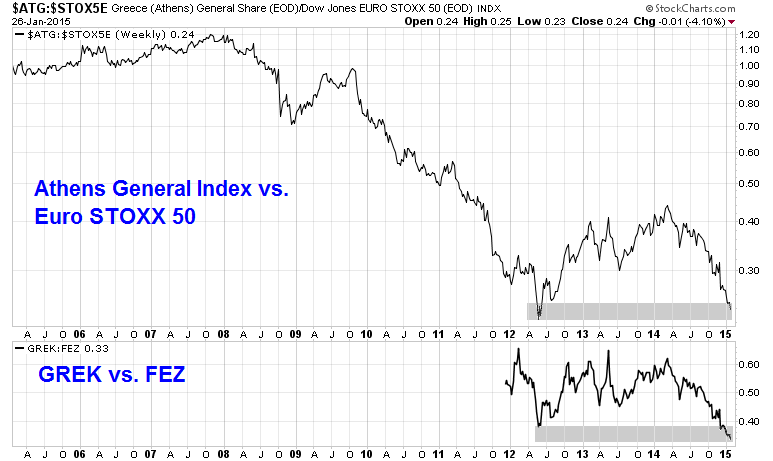I have used the the analogy, 'The (European) parents fight and the kids hear everything' before to describe Europe and it remains true again:
The parents fight and the kids hear everything. The younger, more naive ones, think that the parents are on the verge of a divorce, but nothing could be further from the truth.
Today, we have a couple of "fights" occurring in Europe. First, there is the electoral win by Syriza in Greece, whose platform is to reverse the painful austerity imposed by the Troika (EU, ECB and IMF). As well, there is the news of German unhappiness with the ECB as it announced its QE program.
Greek theater
It seems to me that all of these so-called "fights" are more of the usual European theater that can be ignored. Despite the alarmist rhetoric, the union remains sound.
Take the situation in Greece. A key Syriza platform is Greece stays in the euro. Despite the years of painful austerity, polls show that the vast majority of Greeks want to remain in the euro. The key to interpreting the results of the Greek election is to read between the lines of the results. Here is the report from Ekathimerini (emphasis added):
In a triumphant speech before a large and boisterous crowd outside Athens University, Tsipras said the leftists’ victory was “a victory for all peoples of Europe fighting austerity.” “Greece is turning a page, advancing with firm steps in a Europe which is changing.”
“The mandate of the Greek people today cancels, in an indisputable way, the memorandums,” Tsipras said, referring to Greece’s loan agreements with its international creditors. “It makes the troika a thing of the past.”
He said his government would seek a mutual solution that would allow the country to emerge from its mountainous debt and pledged to to make good on his party’s promise to curb the corruption that contributed to Greece’s debt crisis in the first place. “Today the Greece of the oligarchs, of the elite, of the cover-ups was defeated. Victory was for the Greece that strives, that hopes,” he said.
Note the term "mutual solution". The blogger Longandvariable looked behind the Greek curtain and wrote that the Greek primary account surplus, where the budget was showing a surplus before debt payments, is highly fragile in light of Syriza’s campaign promises:
First, there’s the matter of new and unfunded government expenditure in the Syriza manifesto. Who knows what would eventuate in the coalition-formation process, but they are not currently affordable [ie they would bust the primary surplus on their own].
Second, as the FT reports, tax collection is plummeting right now as Greeks forecast that unpopular property and other taxes will be ended, and perhaps also that there will be less appetite to collect on legacy obligations that the new political leaders discredited. Ironically, this drop in tax collection reduces Syriza’s ability to deliver on the promised goodies which will win them the election.
In other words, the primary budget surplus is likely to substantially disappear once the new government takes over. Notwithstanding these problems, the new government is holding a weak hand when bargaining with the Troika. Everyone knows it.
Cut adrift from the Troika, the Greek government does not have the funds to stand behind its own banks. They would be left insolvent by a Greek default [economically, they are already, really]. A run on Greek banks, either prompted by default or the threat of it, could not be stemmed by a credible guarantee of deposits.
The primary surplus would fast disappear as the contraction in money, credit and economic activity played out.
Here is the response from Germany (via Reuters):
The German government stuck to its view on Monday that a third haircut, or debt restructuring, for Greece was out of the question but opened the door to a possible extension of Greece's current bailout programme.
"That's certainly a possibility or an option and, as I said, we'll go into every discussion constructively ... As always, it depends on how such a request is formulated and on the overall context, but in principle that is an option," German finance ministry spokeswoman Marianne Kothe said at a news conference.
In other words, no bailout, but we are open to negotiation on an extension. However, that kind of loan modification amount to a form of debt haircut on a net present value basis. It's only a question of semantics. Imagine that you are owed $1 million and the debtor offers you a deal where he pays you $1 a year for the next million years. Is that debt relief?
Jacob Soll, writing the NY Times, explains (emphasis added):
The troika itself does not use Ipsas in calculating Greek debt, but rather what is confusingly called the Maastricht definition of debt, which is based on face value.
Think of face value as a promise to pay something in the so-far-distant future because its value is essentially worthless today if you don’t get interest payments. This means that the troika calculates debt neither according to its financial worth, but rather according to a political agreement that ignores very low interest rates and the fact that money increases in value the longer you can hold and invest it. This is working to Greece’s advantage, but Greece can’t show it, and thus benefit from better credit ratings...
The fact that Germany has acted as a vigilant gatekeeper over Greece’s agreement to abide by the agreed debt and austerity measures should deserve scrutiny. Look again at the 57 billion euros ($66 billion) in German loans through the lens of accounting logic. The loans have been made at under 2 percent with maturities as far out as 2054.
That means that, in reality, the interest on this loan is under market rates. Giving loans well under market rates with gaping repayment schedules amounts to a grant. According to Ipsas standards on German debts, this portion of the debt alone would require only about 13 billion euros ($15 billion), leaving Germany with a considerable 44-billion-euro ($51 billion) loss.
The EU has already had a history of giving Greece debt relief in the form of below market interest rates. The key question in the upcoming negotiations is how much more while maintaining the fiction that the face value remains unchanged.
The Berlin-Frankfurt schism
Meanwhile, I saw another brouhaha starting as the Irish Times blared "Germans united in the conviction that the ECB has gone rogue". While headlines like those may sell newspapers, what I found interesting are the areas of agreement that Draghi has with Berlin. They see eye-to-eye on the issue that structural reform remains a necessary condition for growth to recover in the eurozone (see my previous posts Mario Draghi reveals the Grand Plan and Draghi's "growth pact" = Internal devaluation). A recent WSJ article showed that Mario Draghi realizes that the ECB cannot revive growth by itself. It can only buy time for member states to go forward with structural reform:
But in light of Europe’s underlying problems of stagnant growth, high debt and rigid labor markets, ECB President Mario Draghi suggested the central bank’s largess alone won’t be enough to right its economy.
“What monetary policy can do is create the basis for growth,” he said. “But for growth to pick up, you need investment; for investment, you need confidence; and for confidence, you need structural reform.”
Jeremy Warner of The Telegraph, which is a newspaper notorious for anti-Europe views, outlined a nuanced analysis of the current disagreement.
While Mr Draghi was announcing his QE, Angela Merkel, the German Chancellor was coincidentally making a vitally important point to Davos participants; Germans might feel uncomfortable with money printing, they might further worry that it will ease the pressures for reform among profligate eurozone members, but the central bank is independent and must pursue its mandate in whatever way it sees fit.
Notice that while Angela Merkel may not have liked QE,she respects the independence of the central bank. Warner attributed much of the discomfort to the Teutonic obsession over rules:
People often attribute this aversion to money printing to German experience of hyper-inflation in the Weimar Republic.But in fact it’s as much about something even more deeply ingrained in the German psyche than fear of inflation - teutonic obsession with legality and rules.
It was the idea that QE might be illegal under treaties as much as concern about monetary ill discipline that led Germany to resist QE for so long. The other reason was an overtly political one which really should have had no place in an independent central bank. It is that QE might provide the Mediterranean states with the space to go easy on structural and fiscal reform. This is a legitimate concern, but it is one for the politicians to address, not the central bank, a truism that the German Chancellor seemed to recognise in her remarks.
Warner has a point. Much of the history of the ECB response to the financial crisis has been to craft solutions that follow the letter of the law, but bend them in such a way to satisfy its objectives. Viewed in such a context, the so-called Berlin-Frankfurt schism is nothing but a tempest in a teapot.
The union remains strong
There are tensions in any marriage, but this spat amounts to nothing more than "Your brother is a bad influence and I want to you to keep him away from the kids" kind of disagreement.
Likewise, if Warner is correct and the Germans are mainly focused on rules and legalities, then there is room for negotiation with Alexis Tsipras of Syriza. There will no doubt be lots of posturing, threats, along with the requisite shouting and screaming in the days to come, but the differences are unlikely to lead to a serious rupture in the European Union. New Deal democrat summed up the situation this way:
The simple fact is, the Euro states, and the European Union itself, have as much at stake as Greece. Everybody on both sides knows that Italy and Spain, and maybe several other countries as well, are waiting in the wings. If similar parties come to power in those countries, the sustainability of the Eurozone, and the Euro itself, are very much called into question. No further significant European integration has happened in the 15+ years since the Euro was adopted. Reversing EMU strikes at the heart of the European project itself: the binding together of mortal enemies to put an end to centuries of war. Thus every reason for both sides to put on their poker faces and play and extremely high-risk game of chicken.
Zero Hedge reported that Alexis Tsipras' first act as PM was to visit a war memorial where the Nazis executed 200 Greeks in 1944:
The visit could be interpreted in one of two ways. The most obvious explanation is he is sending a message to Germany that the Greeks will no longer be beholden to Berlin (and the Troika). The alternative explanation that I prefer is that the visit signals his European credentials, which is consistent with the Syriza platform of remaining in the euro (as per my previous post Lest we forget, or why you don`t understand Europe):
So is it any wonder that after the carnage of the First World War and the Second World War, the countries of Europe came together and said, "Enough!"
Thus, the EEC and later the EU was born. Today, that project has largely succeeded. We have seen no major European conflict since 1945, the end of the Second World War. The formation of the European Union has kept the peace. The political elite of Europe, despite all the bickering, are still committed to that bigger than life myth of the formation of the EU.
For overseas analysts who look at Europe and only focus on the cost of bailing out Greece, Portugal, etc. Don`t ever forget the political glue that holds Europe together.
Lest we forget.
Mom and Dad are fighting and the kids hear everything, but they aren't going to split up. The (European) union remains strong and it will muddle through.
Greece: A washed-out contrarian play
In practical terms, the chart below of the relative performance of Greek stocks (via Global X FTSE Greece 20 (NYSE:GREK)) to eurozone stocks (via SPDR DJ Euro STOXX 50 (NYSE:FEZ)) shows that Greek stocks are at or near past crisis lows on a relative basis. Expectations are already very low.

Current conditions may represent an entry point into Greek equities for value-oriented investors.
Disclosure and Disclaimer: Cam Hui is a portfolio manager at Qwest Investment Fund Management Ltd. ("Qwest"). This article is prepared by Mr. Hui as an outside business activity. As such, Qwest does not review or approve materials presented herein. The opinions and any recommendations expressed in this blog are those of the author and do not reflect the opinions or recommendations of Qwest.
None of the information or opinions expressed in this blog constitutes a solicitation for the purchase or sale of any security or other instrument. Nothing in this article constitutes investment advice and any recommendations that may be contained herein have not been based upon a consideration of the investment objectives, financial situation or particular needs of any specific recipient. Any purchase or sale activity in any securities or other instrument should be based upon your own analysis and conclusions. Past performance is not indicative of future results. Either Qwest or Mr. Hui may hold or control long or short positions in the securities or instruments mentioned.

